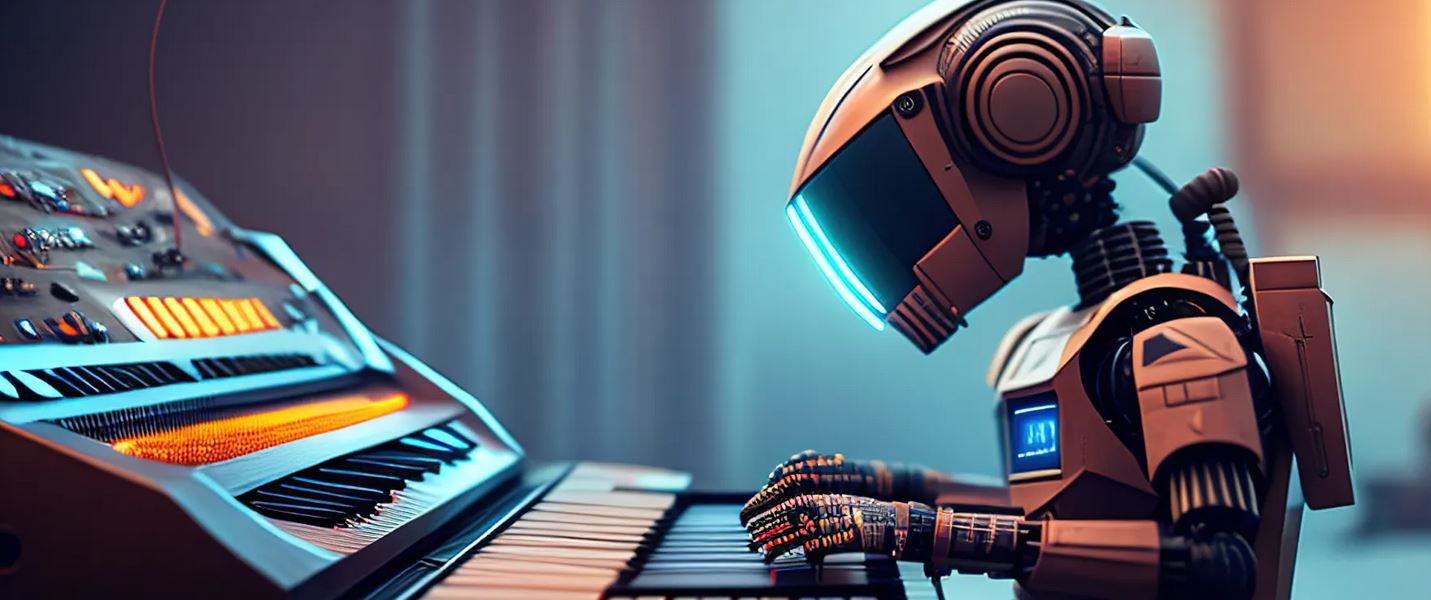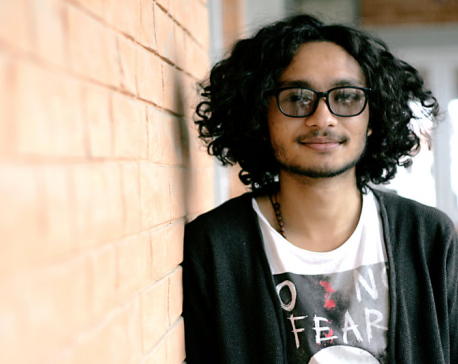
OR
Opinion

AI is poised to play a central role in shaping the future landscape of music creation.
As the music industry grapples with the transformative wave, questions arise about the future of human-crafted music and how seamlessly AI-generated compositions will integrate into the broader musical landscape. In this tech evolution, music faces uncertainties and exciting shifts, shaping a dynamic landscape for creators.
Artificial intelligence (AI) is on the brink of revolutionizing the music industry, as generative AI algorithms autonomously create original compositions. Sir Paul McCartney's recent use of AI to 'extricate' John Lennon's voice for the supposed 'final Beatles record' is a striking illustration of the profound impact at the intersection of musical legacy and cutting-edge technology. Tencent Music's streaming platform boasts an impressive collection of over 1,000 songs featuring AI-generated vocals, drawing millions of plays. As the music industry grapples with the transformative wave, questions arise about the future of human-crafted music and how seamlessly AI-generated compositions will integrate into the broader musical landscape. In this tech evolution, music faces uncertainties and exciting shifts, shaping a dynamic landscape for creators.
AI is poised to play a central role in shaping the future landscape of music creation. While ongoing debates question whether AI will replace human musicians or match the creativity and quality of human-made music, its undeniable impact on music creation is becoming increasingly evident. Rapid strides in AI technology have effectively challenged prior skepticism, showcasing its potential to, at times, even surpass human capabilities in music generation. In alignment with this paradigm shift, a recent article titled "The Future of Music: How Generative AI Is Transforming the Music Industry," authored by Justine Moore and Anish Acharya, has been released on Andreessen Horowitz's website, providing insightful exploration into the disruptive influence of generative AI on the music industry.
Within this expansive piece, Moore and Acharya delve into the intricate domain of generative music, meticulously shedding light on the substantial advancements observed over the past few years and forecasting the profound impact of AI on the music industry. From disrupting traditional music creation methods to examining the diverse applications of AI, the article delivers a comprehensive analysis of the groundbreaking capacities within this field. The authors recognize AI's ascendancy in music, highlighting the viral success of the AI cover of "Heart on My Sleeve" as a pivotal moment that not only validates the existence of AI-generated content but also underscores its potential to produce high-quality output. Notably, the song has been submitted for Grammy consideration in the Best Rap Song category for the year, further solidifying the evolving landscape where AI is increasingly recognized for its creative contributions in the music industry.
Moreover, the article delves into the intricate impact of AI on the music industry, presenting a nuanced viewpoint on its diverse functionalities. By drawing parallels with historical legal challenges, specifically the sampling issues in the early days of hip hop, the piece meticulously traces the evolution of regulations surrounding music creation. Hip hop flourished through a free-for-all sampling culture in the '80s. However, a pivotal shift occurred after the 1991 lawsuit between Gilbert O'Sullivan and Biz Markie, heralding contemporary copyright laws that mandate artists to secure legal permission. In a similar vein, Moore and Acharya argue that it is highly likely that the music industry will again grapple with contrasting perceptions of AI-generated music. AI is poised to impact and challenge the traditional mindset to music creation and copyright.
Furthermore, the article envisions a future where AI, taking the forefront in background music production and disrupting the traditional trade-off between quality and cost while empowering a diverse spectrum of music creators, should not be hampered by stringent copyright laws due to its democratizing influence on music production. The article concludes on an optimistic note, emphasizing the irreplaceable role of the human element in music and foresees a future where users guide themes, and an AI copilot seamlessly contributes to songwriting and production, reflecting a harmonious integration of human creativity and AI innovation in the musical landscape.
The music industry and dominant platforms are actively engaged in restraining innovation by developing tools designed to exclusively identify tracks created by AI, potentially accompanied by stringent laws. Paris-based music distributor Believe spearheads this effort with its proprietary "AI Radar" tool, featuring an AI detection algorithm meticulously crafted to identify tracks entirely generated by artificial intelligence (AI). This in-house-developed tool currently touts an impressive 98% success rate in detecting AI-generated master recordings and exhibits a 93% accuracy in pinpointing "deep fakes." Universal Music Group has also urged streaming platforms to restrict access for AI platforms seeking to "scrape" copyrighted music for the purpose of training AI algorithms. Even with noble intentions, such moves could end up stifling the innovation and progress of human society.
However, in a promising development, future-oriented artists such as Grimes, are seamlessly integrating AI into their creative processes. Grimes has boldly announced her willingness to share 50% of the royalties from successful AI-generated songs that feature her distinctive voice. Grimes' openness to AI tools and voice cloning, aligning her stance with other artists exploring similar technological frontiers, is certainly praiseworthy, setting a precedent for artists in the future. This forward-thinking approach not only fosters creativity but also establishes a collaborative environment between artists and AI, paving the way for a harmonious integration of human and technological elements in the music industry.
In Paul McCartney's groundbreaking AI-assisted Beatles record and Tencent Music's vast collection of AI-generated songs, a profound impact on the music industry is evident. While tools like AI Radar may be used to create draconian copyright laws that stifle innovation, forward-thinking artists like Grimes welcome AI into their creative process, envisioning a harmonious blend of human creativity and AI innovation. Grimes, rejecting traditional copyright norms, promotes a collaborative approach that promises a mutually beneficial future in the evolving AI and music landscape. This shift signifies an ongoing move toward a symbiotic relationship between human and artificial creativity, ushering in a new era in music.
Embracing Grimes's progressive stance is crucial, steering away from the conventional route dictated by the traditional music industry. This trend is particularly noteworthy as it aligns with a broader cultural shift towards valuing collaboration and innovation over restrictive norms. In countries where emerging technologies like AI are embraced rather than restricted, the potential for groundbreaking advancements in music is evident. However, it's important to acknowledge the challenges that arise in a country like Nepal where platforms such as TikTok and entire sectors like cryptocurrency are banned. The limitations imposed in such environments hinder not only the exploration of the future of music but also the development of new and inclusive creative landscapes. With the creative industry already approaching a staggering value of nearly USD 1 trillion, the imperative lies in striking a harmonious balance between technological innovation and cultural openness.
The government must lift the ban on TikTok and cryptocurrency while simultaneously investing in the development of robust monitoring and regulatory capacities.
You May Like This

Music and more music
He began his musical career in 1997 when he sang “Jindagi ko k bharosa” in a music competition when he... Read More...

Mad about music
We are all familiar with the name Deepak Bajracharya, the one behind hit songs like ‘Kali Kali Hissi Pareki’, ‘O... Read More...

Nominations for Hits FM Music Awards declared
KATHMANDU, Nov 28: Nominations for the most awaited 20th Hits FM Music Awards were announced in Kathmandu on Saturday. ... Read More...




Just In
- NEA Provincial Office initiates contract termination process with six companies
- Nepal's ready-made garment exports soar to over 9 billion rupees
- Vote count update: UML candidate continues to maintain lead in Bajhang
- Govt to provide up to Rs 500,000 for building houses affected by natural calamities
- China announces implementation of free visa for Nepali citizens
- NEPSE gains 14.33 points, while daily turnover inclines to Rs 2.68 billion
- Tourists suffer after flight disruption due to adverse weather in Solukhumbu district
- Vote count update: NC maintains lead in Ilam-2














Leave A Comment